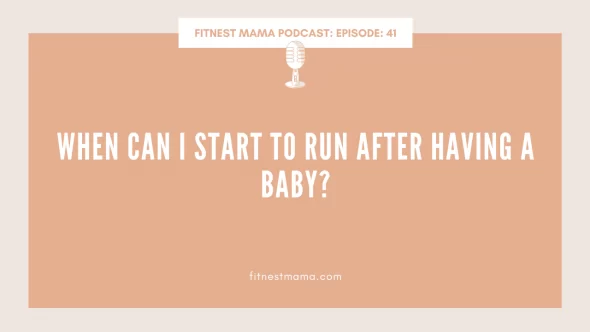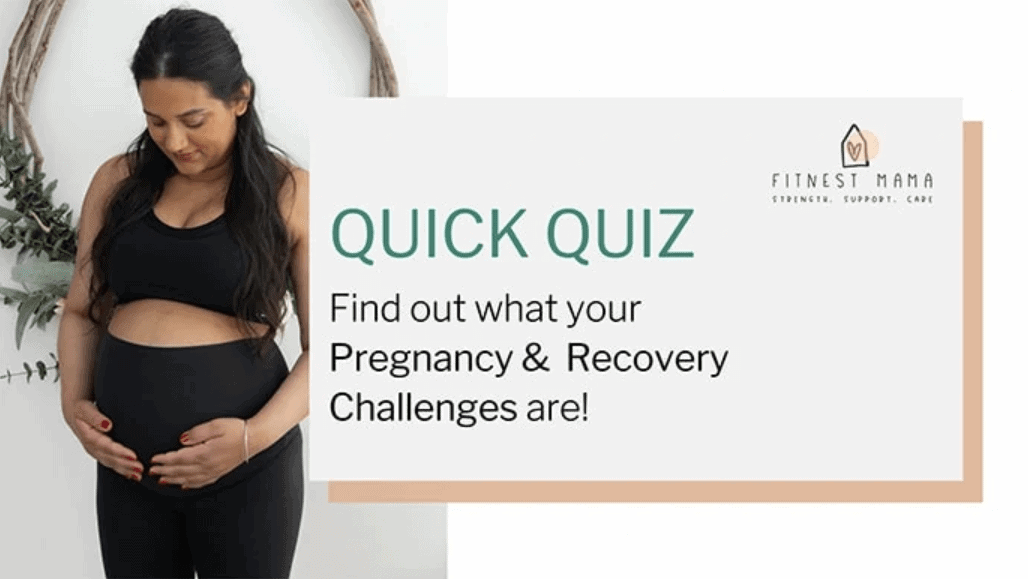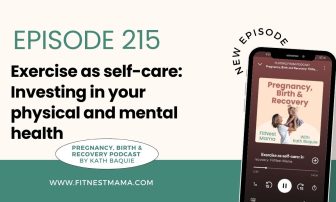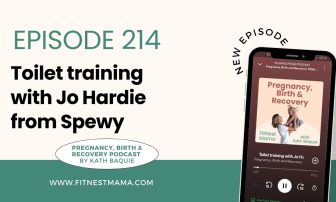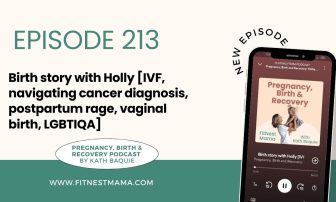Well, Hi there. Welcome to Episode 41 of the FitNest Mama Podcast. So we’re answering the question, when can I return to running after having a baby. And I’m excited to chat about this today, as it is really common for women to want to get back to running or the gym or tennis or whatever it might be for them after having a baby.
And of course, there’s a whole lot of women, I totally get it the don’t want to get back to running. But this episode will be useful for anyone who has had a baby whether or not you want to get back to running. Or even if you just want to boost up your rehab a notch and I totally get it not everyone wants to get back to running marathons after having a baby. But even if you want to be able to run around confidently with the kids at the park, then all listen to this episode, because I’m going to be discussing all the things that I feel are really important to consider when you are wanting to return to exercise and particularly high impact exercise after having a baby.
So before I do jump into this episode, there is an exciting free 3-Day Challenge coming up. So this challenge is for you if you’re at least 12 weeks postnatal, and you’re keen to get back into running, or CrossFit or the gym or tennis or any activity that does require a little bit higher impact and higher intensity. In these 3 days, you will learn if your body is ready for a booster and you’ll learn if your body is ready to take it to the next stage of your postnatal rehab. By the end of these three days you will understand more confidently if your pelvic floor muscles are ready for high impact exercise, you will know what general body stability tests are important to do before getting back into running. And you’ll know how your body has handled these. So important, you’ll get access to a quality workout focus on pelvic floor and core with an introduction to higher impact exercises, along with a two week running plan to get you back on track the right way. I really feel this free 3-day challenge is bridging the gap that a lot of women miss when getting back into running.
So you can do this all from the comfort of your home. You will feel confident and empowered after these three days to take your postnatal rehab up to the next level. Just head to https://fitnestmama.com/runningchallenge or one-word running challenge. And the link is in the show notes. For right. Let’s get into this episode.
So when can I start running after having a baby? As I said, it’s such a common question. And so many women are keen to get back into running at some stage. I personally don’t like to put a time stamp on it. You might have two women, both that three or four months after giving birth. And they might both feel totally different. Your pregnancy, your birth experience, your strength before you even got pregnant, your sleep deprivation, that newborn period, there’s so many different things that can affect how your body is feeling and how you are physically recovering after birth. So here are my top tips for you to consider before returning to running after giving birth.
The first tip is to honour your stage of post Natal recovery. So those first six weeks, or they’re so important, this is the phase that is crucial to allow that pelvic floor that all the soft tissues, the abdominals to all recover, so everything has become stretched. And let’s think about our muscles in our pelvic floor like an elastic band that gets stretched and we know the pelvic floor muscles can stretch up to 300% their length. That’s amazing. So if we think about this elastic band that gets stretched, we want that natural recoil to occur as much as possible. After you’ve had a baby. Your abdominal muscles are stretched; you might have stitches that are healing.
So these first six weeks, it’s a crucial phase in your postnatal rehab and one of the best things You can do for your body in these first six weeks is to rest as much as possible. So avoiding lifting anything heavier than your newborn, which I do know, can be really hard if you’ve got a toddler. You know, for different women, this can be really challenging, but as much as possible trying to lift nothing heavier than a newborn baby. And that’s whether or not you’ve had a vaginal delivery, or a caesarean delivery.
And also, having bursts of horizontal rest throughout the day can work wonders in helping your body’s physical recovery. So that first tip is all about the first six weeks and honouring your phase of postpartum recovering. Secondly, let’s exercise your pelvic floor and core. And this is often what I call the weakest link after having a baby. And it can often get forgotten about before hitting the pavements. So let’s say you’ve had a baby and you didn’t have any perineal stitches, and you had no abdominal muscle separation, I do get quite a lot of women who feel that their recovery is great. And when you feel your recovery is great, and it might be great, your pelvic floor is often not on the forefront of your mind. And it is so easy to forget about it. I 100% understand. There an internal muscle, we can’t see them out of sight out of mind.
However, whether or not you’ve had a vaginal or a caesarean birth, we know that pelvic floor can be weakened as a result of pregnancy and birth. So I do feel all women, after having a baby would benefit from your pelvic floor and core rehab. So let’s start with gentle short lifts, which we can start one to two days after birth. If you’ve had a lot of stitches, do check with your doctor, if you’re not sure. But generally, we can start pretty soon after giving birth as long as it’s not uncomfortable, and it feels fine. And again, do check with your doctor if you’re not sure. But then over the next few days, and weeks, you gradually be able to build up the length and the duration of your pelvic floor holds.
So I remember this being quite a big shock when I first had my first baby because I considered myself having quite strong pelvic floor and the lead up. And then those that first week after childbirth, it was like the muscle, the brain muscle connection had totally been broken. And I thought I can’t. How do I do a lift? I don’t even know where my pelvic floor is anymore. It was a really interesting sensation. But within a few days, I noticed I could do a gentle zipped up, release, lift and release and then I gradually built up from there.
And then the third point here is if possible a pelvic floor assessment from your local pelvic floor physio, it can be a really brilliant way to get you on track, we get postnatal rehab, and give you the confidence that you’re on the right track with your pelvic floor muscle training program. As I said before, they are an internal muscle to the body. And the most accurate way you can tell if you’re doing the exercise properly, and all the different components of your pelvic floor. So it’s not just strength, we want to look at coordination and endurance, your ability to relax, all the different aspects, the best thing you can do is to go and have a pelvic floor assessment.
Okay, so we’ve talked about resting and really honouring those first six weeks, we’ve talked about getting on track with your pelvic floor and core right from those early days. And then from six weeks onward starting general body strength and stability program. And we need to start this before we hit the pavements. So it’s not just pelvic floor and core which is generally weakened after birth, the whole body can be affected. So let’s start with some gentle strength and stability exercises. Once you’ve had your postnatal six week check your medical check. So squats, glutes pelvic stability work. They are all important muscle groups to really work on before hitting the pavements.
Okay, we talked about pelvic floor and strength. Let’s talk about walking because I feel this is another area where women tend to go from A to Z without the few steps in between. So you might totally be all over this at the moment, but I feel like I need to say it. So when we start with our walking, we need to build up our walking endurance slowly. So if you want to get back to running a good place to start is building on your walking in durance. I’m really conservative in those first six weeks because I figure you’ve got the rest of your life to get strong again after having a baby and as I said before, I think those first six weeks are crucial to recovery. I think that’s as a result of seeing so many women are having that firsthand experience, I really do feel that this is what has paved my advice to you at the moment.
So, I generally recommend starting small start with five minute walks in that first week after birth. So once you’re able to get up and about no more than five minutes, so really, if you’re in the hospital that’s just walking around the ward, or perhaps walking around the house when you’re at home. And then in the weeks following, building up five minutes each week, so that’s 10 minutes in week 2, 15 minutes in week 3, and so on. And that means by the time you get to six weeks after birth, you’re walking 30 minutes.
And I really do feel this gradual build up is so much better than, and I made this mistake after my first baby. I hear women, a two weeks postnatal, they go for a walk, and you know, the sun shining, they’re feeling good, they might go 30 minutes in one direction. And then they realized they have to turn around and walk a whole 30 minutes back again. So week two, they accidentally walked 60 minutes. And that’s when they might run into troubles with leaking urinary incontinence prolapse issues or aches and pains, or just fatigue and we’re feeling really exhausted knocked out. So as much as possible, trying to build it up slowly. And of course, with this point, again, as with all my information, do check with your healthcare professional for individualized advice on this as again, it will vary depending on what type of birth you had and your recovery. If you have any concerns about your type of birth stitches healing, do, please check with your health care provider.
Okay, so once you have been doing your pelvic floor and core and general body strength work for minimum six to 12 weeks. So that means you’ve got to be a minimum of 12 weeks after birth, then that’s a stage where I get my members who are doing a 12-Week Return to Running Program, that’s the stage I get them to do some general body stability tests and pelvic floor tests to see if they’re ready to start running.
So I get all my members who are completing the FitNest 12-Week Return to Running Program to complete a pelvic health checklist, pelvic floor stress test, and general body stability tests. And these three tests will give them a really good overview as to whether or not they’re ready to hit the pavements. Again, these pelvic health checklists and the pelvic floor stress test, it doesn’t replace the need to go and get that individualized pelvic floor assessment. But it’s such a great first step for women who wants to go and hit the pavement without doing any of the steps prior.
And if you’re wanting to get access to what I’ve just talked about the pelvic health checklist, the stress tests, the body stability tests, this is what you will get access to in the Free 3-Day Challenge, which is coming up in just a few weeks. So head to the link in the show notes and pop your name down on the list to come and join this challenge where you’ll get access to all this information.
Okay, the sixth step, I think we’re up to the sixth step, it’s to break your big goal into micro goals. So let’s say you want to run 10 km at some stage, have a think what are some micro goals that you can do to help achieve this. And this will look different for everyone depending on your goals. But I really do encourage you all to get out a piece of paper or write down your big goal, and then try to break it down into smaller goals. And this does two things by writing this down. I really feel it helps with motivation, and the ability to realistically achieve your goals. But it will also stop you from biting off more than you can chew.
For example, if you want to do a long 60-minute run, hopefully by writing down these smaller goals that you need to do, it will give you more direction and clarity and it will really help to stop you or help you to avoid suddenly going for a long 60 minute run if you haven’t yet achieved your smaller goals by doing too much too soon. This is when we’re really likely to run into issues with aches and pains or pelvic health concerns such as incontinence or prolapse. Whilst you’re getting yourself onto a running plan, and you’re building up slowly, inconsistently, don’t forget to also focus on your whole body and pelvic floor and core rehab.
So it’s not one or the other. We really want to combine these much as possible, to really make sure you’re working on all the different elements and to help you reach your goals. So if you’ve found what I’ve talked about, you think you need a little bit of help with join our Free Postnatal 3-Days Body Booster Challenge which is your opportunity to discover in 3-Days if your body is ready to boost it after birth recovery.
So as I mentioned before, head to https://fitnestmama.com/runningchallenge, all one word and the link is in the show notes.
So that sit ladies hopefully you enjoyed that episode. Come and send me a DM on Instagram @fitnestmama. If you’ve got any questions at all about returning to running, I would love to hear from you. Have a fabulous day and I look forward to you joining me next week for another episode of the FitNest Mama Podcast.
Thanks for listening to the FitNest Mama Podcast brought to you by the FitNest Mama Freebies found at www.fitnestmama.com/free. So please take a few seconds to leave a review, subscribe so you don’t miss an episode. And be sure to take a screenshot of this podcast, upload it to your social media and tag me at @fitnestmama, so I can give you a shout out too. Until next time! Remember an active pregnancy, confidence childbirth, and strong postnatal recovery is something that you deserve. Remember our disclaimer, materials and contents in this podcast are intended as general information only and shouldn’t substitute any medical advice, diagnosis or treatment. I’ll see you soon!
